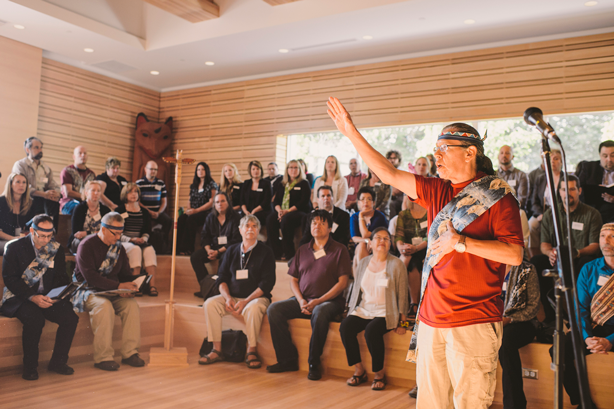Print Edition: January 8, 2014

I remember two things from my new student orientation day. First, my assigned orientation leader, or “student ambassador” as they are now loftily named, looked like the closest thing to a leprechaun I’ve ever seen in all his wild pep and green body paint. Next, I remember that UFV VP Eric Davis’s welcome speech began with a short recognition of our presence on traditional Sto:lo territory. I was impressed. This was the first time I had ever heard anyone acknowledge this outside a classroom setting. It’s a loaded statement, and many people who live on land that historically belongs to the Sto:lo people are unaware of their trespass.
UFV has generally lived up to its recognition of our indigenous peoples. The Elder-in-Residence program, Aboriginal access services department, various certificates in Sto:lo culture, and efforts to make connections in local aboriginal communities demonstrate UFV’s dedication to both supporting the five per cent of students who identify as aboriginal in their studies and to repairing the damage of historical crimes committed against a vibrant culture and peoples.
But what does any of it mean to the average student? A quick word at orientation, a day off for the residential school day of learning, a congratulatory pat on the back for attending such a politically correct school? Most of us are carefully compassionate but woefully ignorant when it comes to actual knowledge of Sto:lo culture.
A quick review of Canadian politics in 2013 demonstrates what this lack of understanding brings. In October, UN special rapporteur on indigenous rights James Anaya reviewed Canada’s treatment of our aboriginal peoples and found it in an unhappy state. According to the CBC, Anaya determined that Canada faces a “crisis” in its conduct towards our indigenous population. The federal government reacted like a defensive five-year-old to the judgement. However, the government’s adversarial approach to indigenous concerns in its insistent pushing of pipelines through traditional aboriginal territory demonstrates the disturbing lack of consideration outlined in Anaya’s report.
It is clear that a broader appreciation of the struggle facing our indigenous population is necessary for compassionate political decision-making.
At UFV, a student can graduate without any understanding of Canada’s relationship with aboriginal peoples. It seems a shame to let students pass through their degree without gaining any appreciation for the culture of our indigenous peoples. This semester only two First Nations studies courses are being offered at UFV.
An expansion of the First Nations studies program would allow for the incorporation of indigenous knowledge and learning styles in a degree.
UFV’s website states that the institution is dedicated to “the recruitment and retention of Aboriginal faculty and staff.” Expanding the First Nations studies program would allow for a higher number of Aboriginal instructors employed at UFV.
If a First Nations studies course was added to the graduation requirements for a bachelor of arts — or any course pertaining to Aboriginal culture, be it in anthropology, history, Halq’eméylem, or current events — students would graduate with at least some understanding of Canada’s indigenous people.
It’s not about being politically correct; rather, it’s about cultivating an empathetic and compassionate graduating class.


